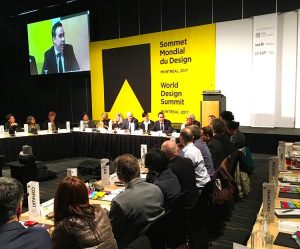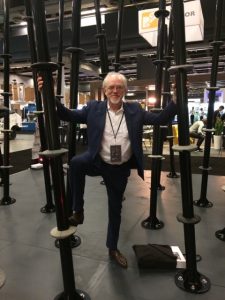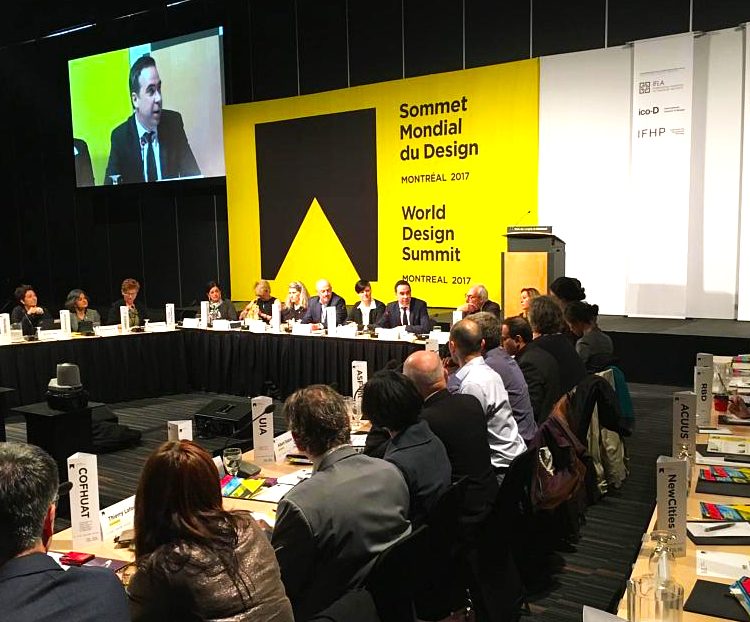
Photo Courtesy of World Design Summit – Montreal 2017
The recent World Design Summit 2017, held in Montreal, was a historic gathering of designers from all practices who shared the objective of developing an international action plan for harnessing the power of design to address some of the world’s most pressing challenges. Occurring on October 16-25, 2017, it was a truly impressive event, and Northeastern University’s College of Arts, Media and Design (CAMD) is pleased that our faculty participated. Nathan Felde, Art + Design, and Kristian Kloeckl, Art + Design and Architecture, both attended and presented talks on successive days.
The Summit itself was unprecedented, with more than 50 international organizations involved, representing design, architecture, urban planning and landscape architecture, all coming together for the first time with representatives of intergovernmental organizations and specialized agencies, such as UNESCO, the Organisation for Economic Co-operation and Development (OECD), the United Nations Environment Programme (UNEP), and the International Council for Local Environmental Initiatives (ICLEI). Together, the goal was for participants to develop and put forth a declaration and 10-year implementation framework for continued international collaboration towards the shared objective: designing a better world for all. The Design Declaration can be read here.
Professor Nathan Felde’s talk, which was selected to be delivered to the Congress of the World Design Summit, was entitled “Design as Risk Management.” He spoke about designers as risk managers, and how the design process reduces the risk of being wrong by building prototypes, and then critiquing and testing them.

“There is a connection between terror and error. If, as philosopher Stanley Cavell states, ‘our capacity for producing danger and harm has surpassed our capacity for kindness and doing good,’ then designers must work with decision-makers, as risk managers, to anticipate, reveal, and close our emergent global protection gap,” Felde, who is a Professor of Design, added.
“It was a privilege to represent Northeastern University at the World Design Summit,” he continued. “The organizers envision this as an annual ‘Davos for Design’ which can have real impact on design issues facing our profession in all our various design practices. The focus on global matters aligns with our university mission and our participation increases the opportunity for our campus-wide design community to evolve and grow.”
Kristian Kloeckl was selected to present his work on “THINGprovisation”, as part of the theme on “Design for Extremes” at the Congress of the World Design Summit. He presented on a panel with colleagues from Carnegie Mellon, the Royal College of Art (RCA) in London and the Royal Melbourne Institute of Technology (RMIT).
“The panel was emblematic for the profound value of an event such as the World Design Summit. A stimulating and inspiring encounter and engaged discussion between panelists and audience that came from all parts of the world to explore today’s boundaries of design. The presentations directly resonated with each other and were furthered by the probing questions and experiences shared by the audience. My proposal for an improvisation based design framework and its emphasis on design for initiative and openness directly resonated with the work of the colleagues from the RCA and RMIT about issues of radical openness in the context of tomorrow’s public libraries,” adds Kloeckl, who is an Associate Professor of Design.
His presentation explored “THINGprovisation,” which is an improvisation-based design model for the design of meaningful interactions in today’s hybrid cities. With a focus on how pervasive urban technologies enable responsiveness and adaptation to human activity, Kloeckl draws parallels between this dynamic and that of improvisational performances to investigate a design model more apt to constructively deal with the kind of change cities and citizens experience today.
Overall, the first World Design Summit meeting was truly a moment of global unity in seeking design-driven solutions. By bringing together international representation of the design professions, it helped to address and explore significant global problems, aspirations and goals.


